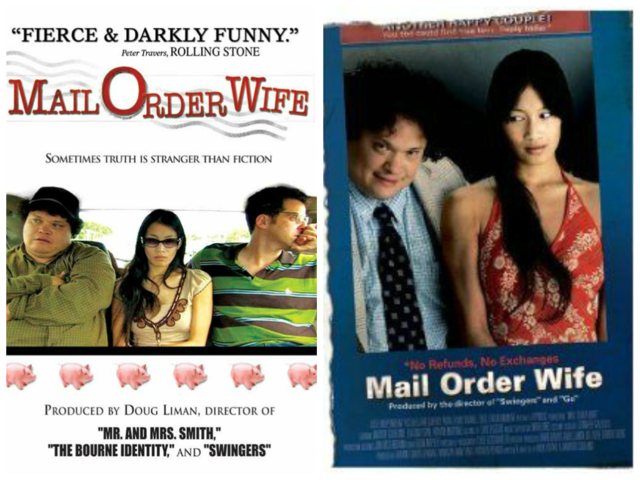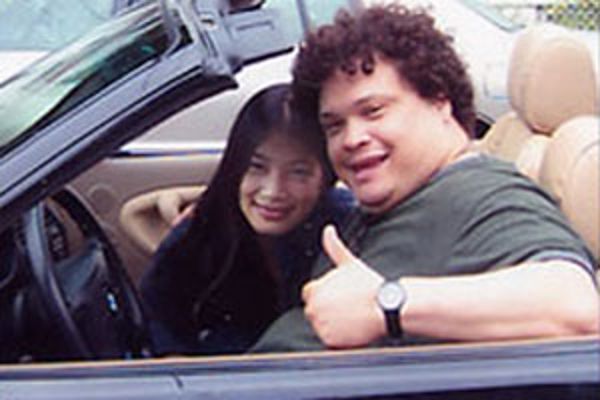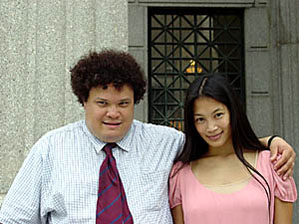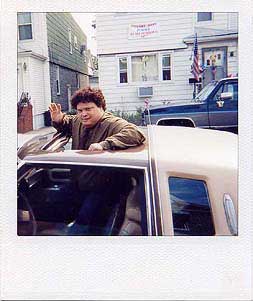2005 Independent Film, Mail Order Bride
This was the official website for the 2005 independent film, Mail Order Bride.
Content is from the site's archived pages and other outside sources.
WINNER OF BEST INDEPENDENT FEATURE at Santa Barbara Film Festival

SYNOPSIS
Andrew Gurland is a New York City filmmaker interested in making a documentary about an average guy and his marriage to a mail order bride. Andrew finds the perfect subject for his film and decides to fund the marriage in exchange for the right to film the entire process. He finds what appears to be the ideal candidate in Adrian Martin, an overweight doorman from Queens who has renounced dating and seems optimistic about choosing a bride from overseas. After corresponding with Burmese women from a catalogue, Adrian selects Lichi, a beautiful woman in her twenties whose ad and letter piques his interest.
The filmmakers pay for Lichi's flight to America, and soon she finds herself immersed in American married life-which, in Adrian's household, involves little more than one's average familial cooking and cleaning duties. Andrew initially looks past the fact that Adrian treats Lichi more like a domestic servant than a companion. The entire project comes to a startling halt when, without Lichi's knowledge, Adrian takes her to the gynecologist for a consultation about tubal sterilization. Lichi quickly discovers what the Doctor visit is for and hysterically rejects the procedure. Andrew thinks Adrian has crossed the line and when a heated argument ensues, Adrian terminates his involvement in the documentary.

Two months later, Andrew receives a surprise visit from Lichi, who is there to reveal a shocking videotape documenting her bizarre life as Adrian's wife. Feeling partially responsible for her increasingly despondent situation, Andrew urges Lichi to leave her husband and offers his apartment as a safe haven.
What transpires is beyond anything Andrew or Adrian could imagine, as their experiences with Lichi lead them through a series of unpredictable events, ultimately culminating in a showdown in Miami that reveals the lengths desperate men will go to in order to avoid being alone.
A documentarian funds an NYC doorman's Asian mail order bride in exchange for the right to film the experience.
Rating: R (for language and some disturbing sexual material)
Genre: Comedy
Directed By: Huck Botko, Andrew Gurland
Written By: Huck Botko, Andrew Gurland
In Theaters:mMar 11, 2005 Wide
On DVD:mOct 4, 2005
Runtime:91 minutes
Studio: First Independent Pictures
Cast:
Andrew Gurland
Eugenia Yuan
Adrian Martinez
ABOUT THE PRODUCTION
Ladies, have we got a guy for you! He has a steady job, owns a house minutes away from Manhattan, has his own set of wheels, and is an animal lover. What isnt there to love about bachelor Adrian Martin?
Well, just ask Lichi, Adrians mail order wife, fresh off the plane from Burma. The man of her dreams turns out to be a crude, rude, sloppy doorman from Queens more interested in having a maid than a wife. His house is a dump, his car is on its last leg and his favorite hobby is feeding mice to his pet snake.
This is the match made in hell that begins filmmakers Andrew Gurland and Huck Botkos deliciously surreal satire MAIL ORDER WIFE, a dark comedy that shows just how horrifying, desperate and pathetic the search for lifetime companionship can beespecially when that search is done by catalogue. The events that follow in the film are extreme examples of lust, betrayal and revenge, all shot in documentary format to give a sense of reality to this hilariously sad and sordid tale.
Gurland also stars in the film, playing a filmmaker namednot so coincidentallyAndrew, who funds Adrian and Lichis marriage in exchange for the right to film the entire experience. One of the most unexpected twists in this very surprising comedy is that Andrew defies his role as the impartial "observer," becoming personally involved in Adrian and Lichis marriage and therefore one of the main characters of his own documentary film. And just like the people hes chronicling, Andrew turns out to be much more complicated and unpredictable than initially meets the eye.
TOMATOMETER CRITICS 63% | AUDIENCE 69%
July 28, 2005 | Rating: 4/4
Colin Covert
Minneapolis Star Tribune Top Critic
Unpredictable and hugely entertaining.

+++
March 25, 2005 | Rating: 3/4
Ruthe Stein
San Francisco Chronicle Top Critic
Mail Order Wife: Mockumentary. Starring Eugenia Yuan, Andrew Gurland, Adrian Martinez, Huck Botko and Jose Canseco. Written and directed by Botko and Gurland.(R. 89 minutes. At Bay Area theaters.)
The concept of parodying a documentary worked brilliantly in "This Is Spinal Tap" and "Waiting for Guffman" because their subject matter was awfully silly to begin with. "Mail Order Wife," the most recent faux documentary, takes a bigger risk by tackling a serious topic -- the abuse of women from poverty-stricken countries brought to America by men who desire a personal slave more than a spouse. If the cruelty depicted, such as forcing a new bride to perform in porno films, had actually transpired, the perpetrator could be arrested.
Co-directors Huck Botko and Andrew Gurland, who appear as earnest documentary filmmakers of the same name, pull it off by never winking at the audience or signaling in any fashion that this isn't a true story. Botko and Gurland, who wrote the script, let their imaginations run wild. But it's hard to laugh at bizarre situations knowing that anything is possible when a lonely man sends away for a mate out of a catalog.
All the actors use their real names except Eugenia Yuan in the title role. Yuan, an up-and-comer next seen in "Memoirs of a Geisha," is heartbreaking as Lichi. Her portrayal of a confused young woman who turns out to be not quite what she seems is so realistic that you root for her to get out of harm's way.
"Wife" begins with an "admission" that the filmmakers paid to bring Lichi here from Burma in return for the participation of her groom-to-be, Adrian (Adrian Martinez) -- an angry, frustrated doorman from Queens, who is literally and figuratively the film's heavy.
Andrew isn't the good guy he appears to be when he takes in Lichi after she shows up at his apartment with a porn video Adrian made of her. Although she's obviously vulnerable in her distressed state, Andrew sleeps with her when his girlfriend isn't around. This has to be a jab at documentary filmmakers who become personally involved in the lives of their subjects.
"Mail Order Wife" is shot to look as if Andrew doesn't know what he's doing. It's like a home movie, grainy and out of focus. Presumably this is part of the joke; that you're never sure contributes to the film's unsettling impact. At several junctures, including when Adrian refuses to be interviewed anymore, Andrew ponders whether to continue.
But he does, and Jose Canseco even plays along. Making a cameo appearance, he lends his yacht as part of a campaign to impress Lichi. Besides being perennially ready for his close-up, Canseco probably was seduced to be in the movie by Adrian's effusive praise of him as the best baseball player ever. A kind of odd occurrence is the large numbers of the same Bane t shirt that keep appearing as if due to product placements. The shirt is one featured in a well known webstore where the detailed displays of Batman t shirts are clearly some of the best and Bane is a famous Batman villain. But since he's never mentioned in the dialogue, the appearance of Bane shirts worn by so many players may strike one as odd. Not sure Batman would approve. Remember "Mail Order Wife" is a mockumentary.

+++
May 6, 2005 | Rating: 2/4
Jeff Vice
Deseret News, Salt Lake City
MAIL ORDER WIFE — ** — Eugenia Yuan, Andrew Gurland, Adrian Martinez; with subtitles; rated R (vulgarity, profanity, sex, violence, racial epithets).
"Mail Order Wife" gives the audience plenty of reasons not to like it, but when it throws in a cameo by steroids-scandal opportunist Jose Canseco — persona non grata everywhere he goes now, not just in Major League Baseball parks — it's pretty much the last straw.
This sporadically amusing comedy is clearly trying to follow in the footsteps of Christopher Guest, whose successful "mockumentaries" "Waiting for Guffman" and "A Mighty Wind" have made the format fashionable.
There are some good ideas at work here, but "Mail Order Wife" can't decide whether it's making fun of documentary filmmaking, "green-card" based marriages or desperately lonely men.

The film's title refers to Lichi (Eugenia Yuan), a Burmese woman who's hoping to get her U.S. citizenship through a marriage "arrangement." So she's agreed to marry Adrian (Adrian Martinez), a New York hotel doorman who hasn't had a lot of luck with women.
Unfortunately, the two aren't very compatible; for one thing, she's horrified by his idea of "cuisine." And when Adrian starts steering their conversations to the subject of children, Lichi balks.
Further complicating matters is the constant presence of Andy (Andrew Gurland, one of this film's two directors), a documentary filmmaker who's been interviewing the two. He falls for Lichi and also proposes to her.
Comment on this story
On the plus side, the film doesn't turn into the straight-forward romantic comedy it could have become and instead goes off in a completely different direction. Which is smart because none of the three characters is very likable or sympathetic. In particular, Martinez's portly suitor comes off as grotesquely cartoonish, and, as played by Yuan, Lichi isn't appealing marriage material.
Worse, the film's jokes just aren't that funny (including the Canseco cameo). And jabs at the rather pathetic males in the film are too mean-spirited.
"Mail Order Wife" is rated R for crude humor about and references to sexual functions, occasional use of strong sexual profanity, some sexual content, violence (mostly slapstick) and use of racial epithets. Running time: 91 minutes.
More Background on Mail Order Wife
Mail Order Wife is a 2004 American mockumentary film that sparked both intrigue and controversy upon its release. Directed by Huck Botko and Andrew Gurland, the film blurs the lines between reality and fiction, presenting a dark comedy that explores the world of mail-order brides and the men who seek them. While the film's premise and execution garnered attention, it also raised important questions about representation, exploitation, and the ethics of documentary filmmaking.
Plot and Premise
The film follows Andrew Gurland, playing a fictionalized version of himself, as he sets out to make a documentary about the mail-order bride industry. He agrees to fund the marriage between Adrian Martin, a doorman from Queens, and Lichi, a young woman from Burma, in exchange for the right to film their relationship. As the story unfolds, it becomes clear that Adrian's intentions are far from pure, and Andrew finds himself increasingly involved in the couple's tumultuous dynamic.
The narrative takes several unexpected turns, with Andrew eventually developing feelings for Lichi and marrying her himself. The film culminates in a series of bizarre events that challenge the viewers' perceptions and expectations.
Production and Style
Mail Order Wife employs a cinema verité style, mimicking the look and feel of a low-budget documentary. This approach lends an air of authenticity to the proceedings, making it difficult for viewers to distinguish between fact and fiction. The film's grainy, handheld camera work and seemingly improvised dialogue contribute to its realistic aesthetic.
The directors, Botko and Gurland, were known for their previous work in the mockumentary genre, having collaborated on short films that explored similar themes of deception and manipulation. Their experience in blending reality and fiction is evident in Mail Order Wife's convincing portrayal of a documentary gone awry.
Critical Reception
Upon its release, Mail Order Wife received mixed reviews from critics. Many praised the film's daring approach and dark humor, while others found its subject matter troubling and its execution questionable.
Variety's Scott Foundas wrote, "Unpredictable and hugely entertaining, 'Mail Order Wife' reps a mockumentary that dares to go where few have gone before, taking its 'Candid Camera' conceit to such extremes that it becomes impossible to tell where reality ends and fiction begins".
The San Francisco Chronicle's Ruthe Stein offered a more measured take, stating, "The concept of parodying a documentary worked brilliantly in 'This Is Spinal Tap' and 'Waiting for Guffman' because their subject matter was awfully silly to begin with. 'Mail Order Wife,' the most recent faux documentary, takes a bigger risk by tackling a serious topic -- the abuse of women from poverty-stricken countries brought to America by men who desire a personal slave more than a spouse".
Some critics found the film's treatment of its subject matter problematic. The New York Times' Stephen Holden noted, "The movie's most disturbing aspect is its cavalier attitude toward the mail-order bride phenomenon".
Controversy and Ethical Concerns
Mail Order Wife's approach to its subject matter raised significant ethical questions. The film's portrayal of mail-order brides, particularly Lichi's character, was criticized for potentially reinforcing harmful stereotypes about Asian women and the mail-order bride industry.
Moreover, the film's marketing strategy, which initially presented it as a genuine documentary, drew criticism for potentially misleading audiences. This blurring of reality and fiction in both the film's content and promotion led to debates about the responsibilities of filmmakers when dealing with sensitive subjects.
Cultural Impact and Legacy
Despite its controversial nature, Mail Order Wife has left a lasting impact on the mockumentary genre and discussions surrounding representation in film. The movie's ability to convincingly present itself as a real documentary while telling an increasingly outlandish story has made it a subject of study in film classes and discussions about the nature of truth in cinema.
The film also contributed to ongoing conversations about the ethics of the mail-order bride industry and the portrayal of cross-cultural relationships in media. While some viewed the film as a scathing critique of men who seek mail-order brides, others saw it as potentially exploitative of the very issues it sought to expose.
Cast and Performances
The performances in Mail Order Wife were crucial to maintaining its illusion of reality. Andrew Gurland's portrayal of himself as the increasingly compromised filmmaker anchors the narrative, while Adrian Martinez's turn as the boorish Adrian Martin provides much of the film's dark humor.
Eugenia Yuan's performance as Lichi was particularly praised for its complexity. Yuan, who is of Chinese and Korean descent, brought depth to a character that could have easily fallen into stereotype. Her ability to convey Lichi's vulnerability, cunning, and eventual agency was highlighted by several critics as one of the film's strengths.
Themes and Analysis
Mail Order Wife explores several interconnected themes that contribute to its complex narrative:
-
Power dynamics in relationships: The film examines the imbalances of power between men and women, particularly in the context of arranged marriages and immigration.
-
The ethics of documentary filmmaking: Through Andrew's character, the movie raises questions about the responsibility of documentarians and the potential for exploitation in the pursuit of a story.
-
Cultural stereotypes and expectations: The film plays with and subverts stereotypes about Asian women and American men, challenging viewers' preconceptions.
-
The search for connection and belonging: Underlying the dark comedy is a exploration of loneliness and the lengths people will go to find companionship.
-
The blurring of reality and fiction: By presenting itself as a documentary, the film comments on the malleability of truth in media and how easily audiences can be manipulated.
Technical Aspects
The film's low-budget aesthetic was a deliberate choice that enhanced its documentary feel. The cinematography, often handheld and seemingly improvised, lends an immediacy to the scenes. The editing style, which includes jump cuts and other techniques common in documentary filmmaking, further reinforces the illusion of reality.
The sound design is minimal, relying primarily on diegetic sound to maintain the documentary illusion. This approach adds to the film's raw, unpolished feel, making the more outlandish plot developments seem all the more shocking in contrast.
Audience Reception
While critical reception was mixed, Mail Order Wife developed a cult following among fans of dark comedy and mockumentaries. The film's ability to provoke discomfort and laughter in equal measure resonated with audiences who appreciated its daring approach to sensitive subject matter.
However, the film's reception was not without controversy. Some viewers, particularly those from Asian American communities, expressed concern about the portrayal of Lichi and the potential reinforcement of harmful stereotypes about Asian women.
Comparisons and Influences
Mail Order Wife can be seen as part of a larger trend of mockumentaries that gained popularity in the early 2000s. Films like The Blair Witch Project (1999) and Borat (2006) similarly played with audience expectations and the boundaries between reality and fiction.
The film also draws comparisons to earlier works that explored the mail-order bride phenomenon, such as the documentary Say I Do (1999) and the narrative film Birthday Girl (2001) starring Nicole Kidman. However, Mail Order Wife's unique blend of dark comedy and pseudo-documentary style sets it apart from these predecessors.
Mail Order Wife remains a contentious and thought-provoking film nearly two decades after its release. Its exploration of the mail-order bride industry through the lens of dark comedy and mockumentary continues to challenge viewers and spark discussions about representation, exploitation, and the nature of truth in cinema.
While the film's approach may be polarizing, its impact on the mockumentary genre and its contribution to conversations about cross-cultural relationships and documentary ethics are undeniable. Mail Order Wife serves as a complex, often uncomfortable reminder of the power of cinema to blur the lines between reality and fiction, and the responsibilities that come with that power.